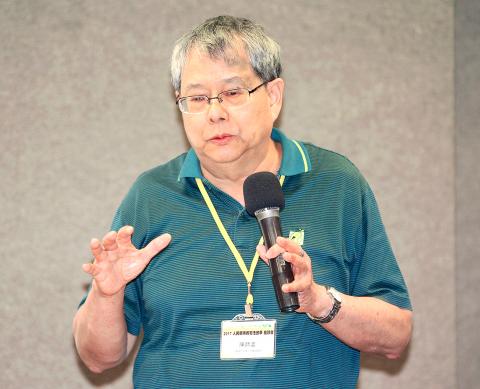A weekend conference on the nation’s judicial system attended by legal experts and representatives of civic groups heard concerns from several participants that the Presidential Office-led judicial reform effort is being derailed by entrenched forces inside the judiciary.
“Taiwanese do not trust the justice system because our nation still has not completed the ‘transitional justice’ process and is just in the starting stages of judicial reform,” Legal Aid Foundation secretary-general Chen Wei-shyang (陳為祥) said.
“In Japan and Germany, there is no crisis of distrust in their justice systems, and their citizens do not suspect court judges of taking bribes,” Chen said.

Photo: CNA
“However, we have a very serious problem of distrust in Taiwan,” he said.
The conference in Taipei was organized by the Friends of Beanstalk Association, the Ketagalan Institute, the Taiwan Forever Association and the Taiwan Jury Association and was supported by legal reform advocacy groups and other organizations.
Friends of Beanstalk Association chairman Chen Shi-meng (陳師孟), a former Democratic Progressive Party (DPP) member, said the government’s judicial reform efforts have lost their focus, as they overlook the real malaise plaguing the justice system.
Reforms have been derailed by judicial officials, most of whom are seeking to block reform to preserve their own privileged positions, Chen Shi-meng said.
“The people inside the judiciary are resisting the reform measures, and are attempting to retain the power and privilege they gained from the previous Chinese Nationalist Party (KMT) administrations,” he said.
The meetings being held by the preparatory committee for the National Congress on Judicial Reform should be talking about how to remove “dinosaur judges” and other unsuitable officials, such as prosecutors who do not do their job or use prosecution as a tool for political suppression, he said.
“The Legislative Yuan should amend the Judges Act (法官法) to place checks and balances on the justice system,” Chen Shi-meng said. “The Control Yuan should be proactive in impeaching judiciary officials found guilty of misconduct, negligence in their duty or criminal acts.”
A number of legal experts have called for implementing a jury system, but there has been resistance at several levels, as well as a debate over whether there should be 12-person juries like in the US or UK, or a more limited participatory jury system with only six jurors, whose decisions can be ignored by a judge.
“Throughout my career, I have seen too much injustice and misconduct in trials, and too often there have been miscarriages of justice. That is why I support the courts going with a jury system,” attorney Jerry Cheng (鄭文龍) said.
Openness and democracy are necessary for the judiciary, Cheng said.
Implementing a jury system is one of the ways to realize such openess because it would allow the public to participate in court rulings, he said.
Taiwan Jury System director Chang Ching (張靜), a former judge, said too many judges make rulings based on their personal biases or political leanings.
Jury systems have been successful in other countries and allow the judges to focus on trial procedures and application of the law, while leaving the judgements to the jury members, Chang said.
Additional reporting by staff writer

Taiwanese can file complaints with the Tourism Administration to report travel agencies if their activities caused termination of a person’s citizenship, Mainland Affairs Council Minister Chiu Chui-cheng (邱垂正) said yesterday, after a podcaster highlighted a case in which a person’s citizenship was canceled for receiving a single-use Chinese passport to enter Russia. The council is aware of incidents in which people who signed up through Chinese travel agencies for tours of Russia were told they could obtain Russian visas and fast-track border clearance, Chiu told reporters on the sidelines of an event in Taipei. However, the travel agencies actually applied

Japanese footwear brand Onitsuka Tiger today issued a public apology and said it has suspended an employee amid allegations that the staff member discriminated against a Vietnamese customer at its Taipei 101 store. Posting on the social media platform Threads yesterday, a user said that an employee at the store said that “those shoes are very expensive” when her friend, who is a migrant worker from Vietnam, asked for assistance. The employee then ignored her until she asked again, to which she replied: "We don't have a size 37." The post had amassed nearly 26,000 likes and 916 comments as of this

New measures aimed at making Taiwan more attractive to foreign professionals came into effect this month, the National Development Council said yesterday. Among the changes, international students at Taiwanese universities would be able to work in Taiwan without a work permit in the two years after they graduate, explainer materials provided by the council said. In addition, foreign nationals who graduated from one of the world’s top 200 universities within the past five years can also apply for a two-year open work permit. Previously, those graduates would have needed to apply for a work permit using point-based criteria or have a Taiwanese company

The Shilin District Prosecutors’ Office yesterday indicted two Taiwanese and issued a wanted notice for Pete Liu (劉作虎), founder of Shenzhen-based smartphone manufacturer OnePlus Technology Co (萬普拉斯科技), for allegedly contravening the Act Governing Relations Between the People of the Taiwan Area and the Mainland Area (臺灣地區與大陸地區人民關係條例) by poaching 70 engineers in Taiwan. Liu allegedly traveled to Taiwan at the end of 2014 and met with a Taiwanese man surnamed Lin (林) to discuss establishing a mobile software research and development (R&D) team in Taiwan, prosecutors said. Without approval from the government, Lin, following Liu’s instructions, recruited more than 70 software